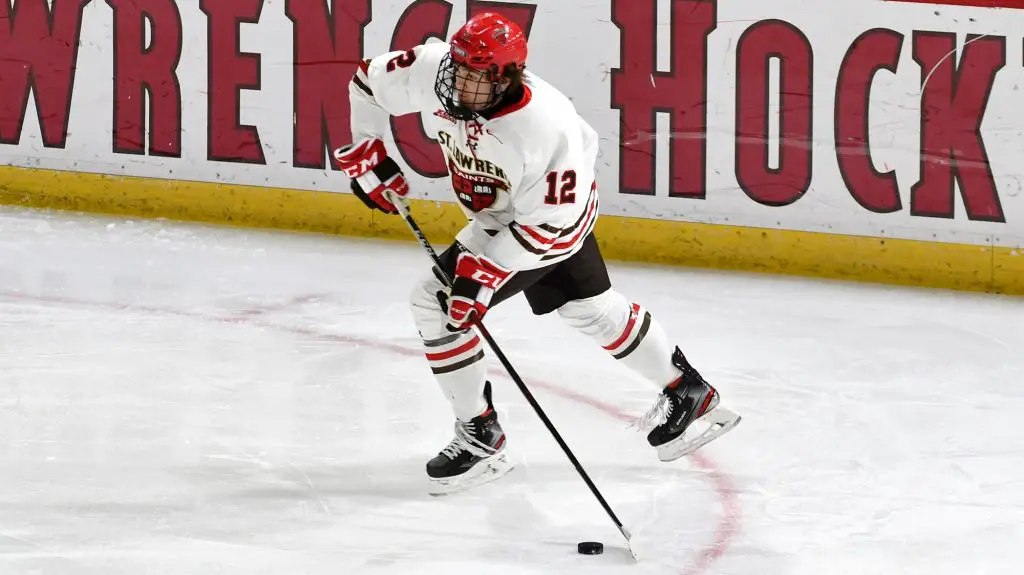
Any college hockey coach will tell you that, at the end of the day, you must judge things by wins and losses. Which is certainly true.
But sometimes life changes that underlying philosophy.
And that’s the case for the St. Lawrence men’s hockey team right now.
When the Saints took the ice on opening night at UMass Lowell, there was a victory for the team prior to the opening faceoff. For that evening, as the starting skaters strode from the goal line to the blueline as their names were announced, out skated left wing Greg Lapointe.
With that moment, the Larries – and Lapointe – earned their first victory.
In the summer of 2021, Lapointe was diagnosed with Hodgkin lymphoma, a rare cancer that attacks the lymph system of the body. He missed the entire 2021-22 season.
“Greg wasn’t even at school last year,” said St. Lawrence coach Brent Brekke. “He went through chemo and then ended up having to go through a second round because he had a spot pop back up.”
Lapointe wasn’t able to return in the second half of last season, remaining at home in Quebec undergoing treatment. The second round of treatment though left him in remission by summertime with a desire to head back to Canton, N.Y.
“He went into the second half of [last season] doing stem-cell treatment late winter/early spring,” said Brekke.
Knowing that he was ready to return to campus to begin this season, Brekke said, was a huge boost for the club. Seeing him come back ready to play hockey brought forth a different type of euphoria.
“To have in the locker rooms is a huge, huge shot in the arm for the guys,” Brekke said. “He’s been through the most challenging adversity anyone can have in their life. To beat cancer is a pretty significant thing. All of our guys recognize what he’s been through.”
Last Friday night, in a 3-1 victory over Merrimack, Lapointe tallied two assists, setting up a shorthanded goal by Max Dorrington at 13:46 of the first. He followed that up with a second assist on Drake Burgin’s insurance goal with 9:39 left that accounted for the final score.
The two assists are a precursor to what his coach knows will be a season that includes a few big goals, particularly given Lapointe’s skill level.
“He’s a kid who can score,” Brekke said. “He can plat out score. He has not lost his ability to put the puck in the net.
“It’s just a real nice story to have him back. We didn’t know where he’d be coming back to campus this year. It’s tough to put an expectation in place except to have him back and be part of things. His condition, strength will still take some time to get him back to where he was prior. But his ability, his personality in the locker room, his day-to-day has just been tremendous.
“If he never practiced or played a game, just to have him in the locker room would’ve been a huge, huge plus. He’s way ahead of where he thought he would be.”
Bobcats heading to Grand Forks for one of the early, premier matchups
Quinnipiac was impressive on Friday with a 4-0 win on the road over Boston College and on Sunday may have been a little disappointed settling for a 2-2 tie at home against LIU, letting slip away a 2-0 lead they held late in the second period.
But memories of the weekend will need to be short lived as the No. 8 Bobcats play one of the top weekend series in the country traveling to Grand Forks for a two-game road series against No. 3 North Dakota.
The two clubs have faced off just six times in history with North Dakota winning five of those battles. Quinnipiac earned the first victory in that series last October in Hamden, Conn., a 5-2 victory.
Of course, the most famous game between the Fighting Hawks and Bobcats came in Tampa, Fla., home of this year’s Frozen Four. It was the 2016 national title game where North Dakota cruised to a 5-1 victory when Drake Caggiula scored twice early in the third to break open the game.
A need for non-conference success
To date, the ECAC is 5-8-2 against non-conference opponents, good for a .400 winning percentage.
Not bad, but the league will need to continuously improve if there are hopes of getting more than one or two bids to the NCAA tournament.
But don’t fret, ECAC fans. The good news for this league that may not apply to leagues like Atlantic Hockey and the CCHA is that five of the 12 teams – the Ivies – haven’t even dropped the puck.
The ECAC has north of 100 non-conference games, so 15 games is close to about 10 percent of the total games the conference will player this year. Conversely, Atlantic Hockey has played closer to 20 percent of its non-conference games, limiting the time the league has to make up for a slow non-league start.
In other words, ECAC fans should hope for non-conference success and soon. But the grave for this league isn’t dug and shouldn’t be of any concern until, say, Thanksgiving.


